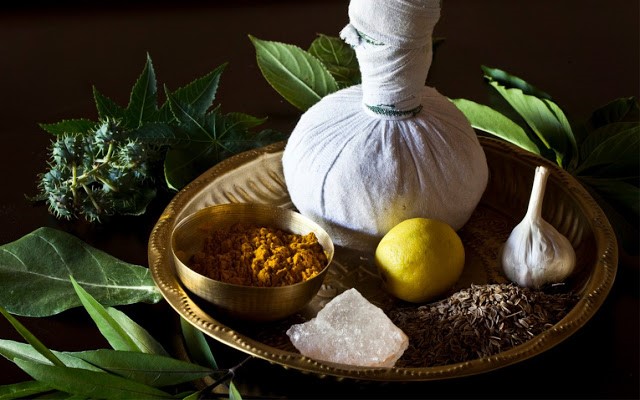Ayurvedic medicine (Ayurveda) is an ancient, centuries-old medical system that originated in India. It’s currently practiced as a form of complementary medicine in many countries, including the United States.

Ayurvedic practitioners believe they can successfully address many health conditions, including:
- Asthma
- Allergies
- Eczema
- Digestive disorders
- Osteoarthritis
- Diabetes
The basics of Ayurvedic medicine
In Ayurvedic medicine, there are five elements that permeate the entire universe, as well as our bodies. These elements are space, air, water, earth, and fire. They combine to promote health, by forming and maintaining the healthy balance of three doshas, which exist in each living thing.
When the doshas become imbalanced, illness results. These doshas are:
- Vata (air and space)
- Kapha (earth and water)
- Pitta (fire and water)
Each person has one primary dosha, which is meant to be stronger than the others. People with a strong pitta dosha are thought to be those most likely to get asthma.
Despite widespread use, there’s little scientific data available to back up the value of Ayurveda. However, there’s some evidence indicating that the herbs used in Ayurvedic treatments may have benefits for people with asthma.

Ayurvedic treatment and asthma
Ayurvedic practitioners use multiple techniques to bring the body into a balanced, disease-free state. They include:
- Saying mantras
- Massage
- Yoga
- Oral and topical use of herbs
- Dietary and lifestyle changes
- Breathing exercises
For the treatment of bronchial asthma and allergic asthma, Ayurvedic practitioners have reported on the successful use of several herbal treatments. These include Argemone mexicana, a common herb that can be found growing wild throughout India. Other herbs include:
- Cassia sophera
- Piper betel
- Holy basil (tulsi)
- Euphorbia hirta, often referred to as asthma weed
These and other herbs may have antihistamine, bronchodilating, and anti-asthmatic properties.
Ayurvedic practitioners also focus on diet, exercise, and deep breathing techniques to help reduce asthma symptoms.
Other treatments
Western medicine often starts with a written asthma plan that includes identifying your asthma triggers and how to avoid them. Your asthma plan will also include instructions for handling flare-ups and information about when to call your doctor in case of an emergency.
Well-studied medications are used for both long-term control and immediate symptom relief. These medications include:
- Rescue inhalers. Portable devices that deliver a premeasured dose of medications to reduce swelling and irritation. Some inhalers are designed to stop asthma attacks quickly.
- Long-acting bronchodilators. These are inhaled medications or a combination of medications that provide long-acting opening of the airways. They’re maintenance medications and include things like inhaled corticosteroids.
- Nebulizers. Nebulizers aren’t portable. They may use some of the same medications inhalers do and are highly effective at stopping asthma attacks.
- Pills. Oral medications for asthma may be prescribed for daily or occasional use. These include corticosteroid medications and leukotriene modulators, designed to reduce inflammation in the airways.
- Immunomodulators. Also known as biologics, these injectable medications are used to treat severe asthma symptoms. They work by reducing sensitivity to trigger allergens in the environment, such as dust mites or pollen.
How Does Body Revival Work On Asthma ?
Body revival is an ayurvedic medicine based on the concept of immunotherapy it boost your immune system to fight cancer naturally. Testimonials of the patients using the medicine Body Revival shows that it is a proven ayurvedic formula for boosting immune system.
It works in two simple principles -
1. It dissolves the unhealthy components of cancer cells and tissues and drives away the (Mala) from the body through excreta.
2. It revives and helps in regeneration of the new cells. This helps glands and organs to function in the natural way.